| Srl | Item |
| 1 |
ID:
068851
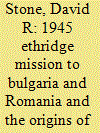

|
|
|
| 2 |
ID:
075298
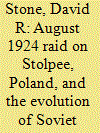

|
|
|
|
|
| Publication |
2006.
|
| Summary/Abstract |
In August 1924, a Soviet-sponsored raid on the Polish town of Stolpce to free two imprisoned communist activists went badly wrong. Though the ruling Politburo had not authorized this raid, the public embarrassment and diplomatic consequences led the Soviet government to overhaul its program of ‘active intelligence’, halting peacetime attacks on neighboring states in favor of quieter preparations for wartime sabotage and diversion under the authority of the Red Army's Intelligence Directorate. At the same time, the Politburo organized stay-behind groups in Soviet border regions to prepare for the possibility of enemy occupation.
|
|
|
|
|
|
|
|
|
|
|
|
|
|
|
|
| 3 |
ID:
070213
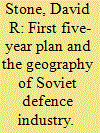

|
|
|
| 4 |
ID:
116784
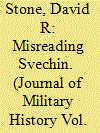

|
|
|
|
|
| Publication |
2012.
|
| Summary/Abstract |
Soviet military theorist Aleksandr Svechin is often misperceived as an advocate of strategies of attrition over destruction or annihilation. In fact, Svechin was an historicist, who saw the precise balance between attrition and annihilation, or defense and offense, as constantly shifting as a result of changing material circumstances. A close examination of his theoretical and historical works reveals the depth of his thinking, while his response to Russia's 1916 Brusilov Offensive shows his support for ambitious strategies of annihilation under the proper circumstances.
|
|
|
|
|
|
|
|
|
|
|
|
|
|
|
|
| 5 |
ID:
088825
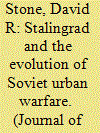

|
|
|
|
|
| Publication |
2009.
|
| Summary/Abstract |
Examining Soviet urban warfare at Stalingrad, particularly in comparison to pre-war Soviet doctrine on combat in cities, suggests a number of conclusions about Soviet military performance. Soviet victory was not simply a matter of enormous human sacrifice, but also required winning the production battle with Nazi Germany. The Red Army also had to master the tactics of urban warfare from bitter experience, given the underdeveloped state of Soviet doctrine before the war and lack of relevant experience before Stalingrad. Despite that, the Soviets proved to be highly skilled at urban warfare. Given that fighting in cities requires great initiative and improvisation on the part of individual soldiers and junior officers, the Soviet victory further undermines the outdated conventional wisdom of stolid and faceless Russian soldiers.
|
|
|
|
|
|
|
|
|
|
|
|
|
|
|
|
| 6 |
ID:
095659
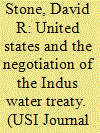

|
|
|